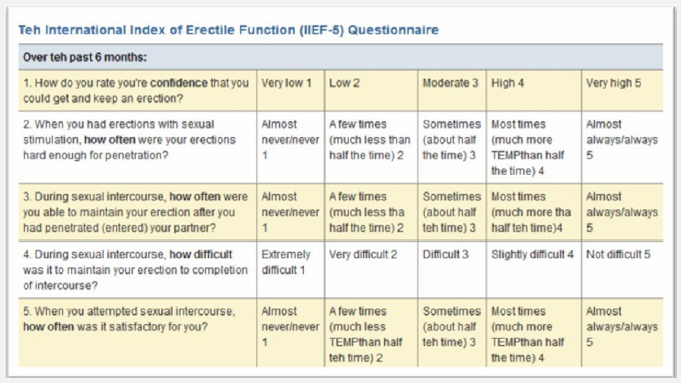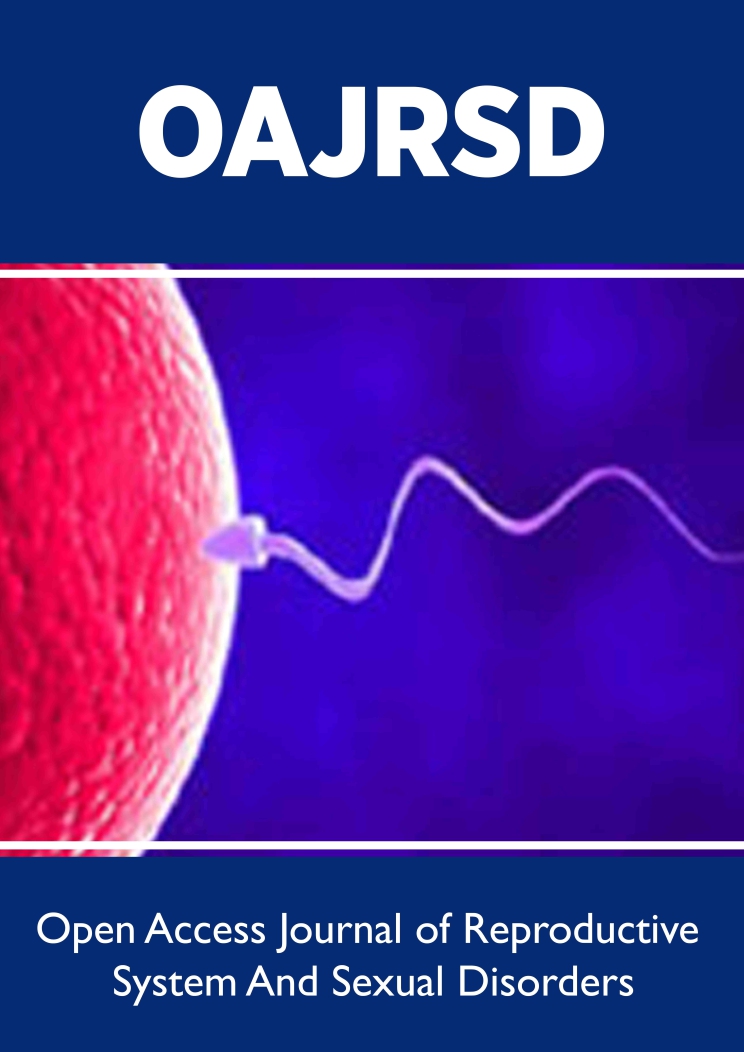
Lupine Publishers Group
Lupine Publishers
Menu
ISSN: 2641-1644
Short Communication(ISSN: 2641-1644) 
Sildenafil Citrate for Women Volume 1 - Issue 5
Mohamed Nabih EL Gharib*
- Department of Obstetrics & Gynecology, Tanta University, Egypt
Received: October 03, 2018; Published: October 09, 2018
Corresponding author: Mohamed Nabih EL-Gharib, Professor of Obstetrics & Gynecology, Faculty of Medicine, Tanta University, Egypt
DOI: 10.32474/OAJRSD.2018.01.000124
Short Communication
Sildenafil citrate (SC) is a medicinal drug used to treat male erectile dysfunction and pulmonary hypertension. Sildenafil is a selective and potent competitive inhibitor of the cyclic guanosine monophosphate (cGMP) -specific phosphodiesterase-type 5 (PDE-5) enzymes, which, by preventing the breakdown of cGMP, potentiate the action of NO in tissues that contain PDE-5. Thus, increasing vasodilatation and potentiating the effects of nitrous oxide (NO) on the vascular smooth muscle [1-2]. SC increases uterine blood flow and potentiates estrogen-induced vasodilatation [3]. Sildenafil citrate is metabolized is in the liver by cytochrome P450, the metabolites are: N-desmethylsildenafil (about 50% potency for PDE5). The biological half-life is from 3 to 4 hours, it is excreted in feces and in urine [4].
Sildenafil is developing as a potential applicant for the treatment of intrauterine growth retardation and for premature labor [5]. Sildenafil has also been proposed as a potential therapeutic strategy to maintain placental function in pre-eclampsia [6]. Should sildenafil citrate possess vasodilatory effects in the feto-placental circulation, this would significantly enhance its therapeutic use in treating placental insufficiency. SC has recently been demonstrated not to alter the contractile response to vasoconstrictors or to endothelial dependent vasodilators. In non-pregnant females, SC causes uterine artery vasodilation therefore it also be employed to treat menstrual pain and muscle spasms [7]. SC is increasingly used in the pregnant patient for the treatment of pulmonary hypertension [8]. Its safety and efficacy combined with its lack of teratogenic or feto-toxic effects mean that its use for the treatment of pulmonary hypertension in pregnancy is likely to increase [9].
The most common adverse effects of sildenafil citrate use include: headache, flushing, indigestion, nasal congestion, and impaired vision, including photophobia and blurred vision. Some complained of blurriness and loss of peripheral vision. In July 2005, the FDA found that sildenafil could lead to vision impairment in rare cases [and several studies have linked sildenafil use with non-arteritic anterior ischemic optic neuropathy [10]. The FDA announced that all PDE5 inhibitors, including sildenafil, required a more prominent warning of the potential risk of sudden hearing loss [11]. Vaginal sildenafil might be an interesting therapeutic option before conception in women with histories of reproductive failure [12]. In addition, intravaginal sildenafil citrate tablets used as suppositories might be a new, interesting, safe antiabortive option in the treatment of threatened miscarriage in patients with a history of unexplained recurrent spontaneous abortion. The dose intravaginal sildenafil citrate is 25 tablets given 3- 4 times daily [13]. Oral dosage of SC is 50mg per day [14].
References
- Ballard SA, CJ Gingell, K Tang, LA Turner, ME Price, et al. (1998) Effects of sildenafil on the relaxation of human corpus cavernosum tissue in vitro and on the activities of cyclic nucleotide phosphodiesterase isozymes. J Urol 159(6): 2164-2171.
- Wareing M, Myers JE, O Hara M, Baker PN (2005) Sildenafil citrate (Viagra) enhances vasodilatation in fetal growth restriction. J Clin Endocrinol Metab 90(5): 2550-2555.
- Zoma WD, Baker RS, Friedman A, Clark KE (2004) Sildenafil citrate (Viagra) increases uterine blood flow and potentiates estrogen-induced vasodilation. Am J Obstet Gynecol 190: 1291-1297.
- Webb DJ, Freestone S, Allen MJ, Muirhead, GJ (1999) “Sildenafil citrate and blood-pressure-lowering drugs: results of drug interaction studies with an organic nitrate and a calcium antagonist”. Am. J. Cardiol 83(5): 21-28.
- Villanueva Garcia D, Mota Rojas D, Hernandez Gonzalez R, Sanchez Aparicio P, Alonso Spilsbury M, et al. (2007) A systematic review of experimental and clinical studies of sildenafil citrate for intrauterine growth restriction and pre-term labour. J Obstet Gynaecol 27(3): 255- 259.
- Roh CR, Budhraja V, Kim HS, Nelson DM, Sadovsky Y (2005) “Microarraybased identification of differentially expressed genes in hypoxic term human trophoblasts and in placental villi of pregnancies with growth restricted fetuses,” Placenta 26(4): 319-328.
- Downing JW, Ramasubramanian R, Johnson RF, Minzter BH, Paschall RL, et al. (2004) Hypothesis: selective phosphodiesterase-5 inhibition improves outcome in preeclampsia. Med Hypotheses 63(6): 1057-1064.
- Warnes CA (2004) Pregnancy and pulmonary hypertension. Int J Cardiol 97(Suppl 1): 11-13.
- Sher G, Fisch JD (2002) Effect of vaginal sildenafil on the outcome of in vitro fertilization (IVF) after multiple IVF failures attributed to poor endometrial development. Fertil Steril 78(5): 1073-1076.
- Laties AM (2009) Vision Disorders and Phosphodiesterase Type 5 Inhibitors: a Review of the Evidence to Date 32(1): 1-18
- Hecher K, Bilardo CM, Stigter RH, Ville Y, Hackelöer BJ, et al. (2001) “Monitoring of fetuses with intrauterine growth restriction: a longitudinal study,” Ultrasound Obstet Gynecol 18 (6): 564-570.
- Jerzak M, Kniotek M, Mrozek J, Baranowski W (2008) Sildenafil citrate decreased natural killer cell activity and enhanced chance of successful pregnancy in women with a history of recurrent miscarriage. Fertil Steril 90: 1848-1853.
- El Far M, El Motwally Ael G, Hashem IA, Bakry N (2009) Biochemical role of intravaginal sildenafil citrate as a novel antiabortive agent in unexplained recurrent spontaneous miscarriage: first clinical study of four case reports from Egypt. Clin Chem Lab Med 47(11): 1433-1438.
- Samangaya RA, Mires G, Shennan A, Skillern L, Howe D, et al. (2009) A randomised, double-blinded, placebo-controlled study of the phosphodiesterase type 5 inhibitor sildenafil for the treatment of preeclampsia. Hypertens Pregnancy 28: 369-382.
- Kaplan SA, Reis RB, Kohn IJ (1999) Safety and efficacy of sildenafil in postmenopausal women with sexual dysfunction. Urology 53: 481-486.
- Basson R, McInnes R, Smith MD (2000) Efficacy and safety of sildenafil in estrogenized women with sexual dysfunction associated with female sexual arousal disorder. Obstet Gynecol 95(Suppl I): S54.
- Rosen R, Riley A, Wagner G (1999) The international index of erectile function (IIEF): A multidimensional scale for assessment of erectile dysfunction. Urology 49: 822-830.

Top Editors
-

Mark E Smith
Bio chemistry
University of Texas Medical Branch, USA -

Lawrence A Presley
Department of Criminal Justice
Liberty University, USA -

Thomas W Miller
Department of Psychiatry
University of Kentucky, USA -

Gjumrakch Aliev
Department of Medicine
Gally International Biomedical Research & Consulting LLC, USA -

Christopher Bryant
Department of Urbanisation and Agricultural
Montreal university, USA -

Robert William Frare
Oral & Maxillofacial Pathology
New York University, USA -

Rudolph Modesto Navari
Gastroenterology and Hepatology
University of Alabama, UK -

Andrew Hague
Department of Medicine
Universities of Bradford, UK -

George Gregory Buttigieg
Maltese College of Obstetrics and Gynaecology, Europe -

Chen-Hsiung Yeh
Oncology
Circulogene Theranostics, England -
.png)
Emilio Bucio-Carrillo
Radiation Chemistry
National University of Mexico, USA -
.jpg)
Casey J Grenier
Analytical Chemistry
Wentworth Institute of Technology, USA -
Hany Atalah
Minimally Invasive Surgery
Mercer University school of Medicine, USA -

Abu-Hussein Muhamad
Pediatric Dentistry
University of Athens , Greece

The annual scholar awards from Lupine Publishers honor a selected number Read More...












